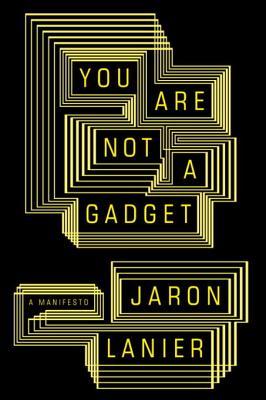
The vast fanning out of the fates of these words will take place almost entirely in the lifeless world of pure information. Real human eyes will read these words in only a tiny minority of the cases.
And yet it is you, the person, the rarity of my readers, I hope to reach.
The words in this book are written for people, not computers.
I want to say: You have to be somebody before you can share yourself.
– Jaron Lanier, ending comments in the preface to You Are Not a Gadget
I highly recommend this book for all technologists, and for anyone concerned about the role of technology in the future of culture, the economy, and our humanity.
This is not simply a book about technology, or a warning call against social media. This is a deep dive into the meaning of person-hood in a world overrun by the philosophy of technological open culture. I’m convinced that in reading this book, even if you walk away with a continued support for open culture, you will walk away with a clearer picture of society and your own humanity.
I don’t necessarily agree with every line of thought or proposed solution by Jaron Lanier. But I value his writing for the strength of his vision, and the eye-opening discussion of what the internet could have been, from the perspective of a technologist who was in the thick of the action when it happened. It’s insidious that many of us grew up with, and have been habituated to, the current state of technology, so we don’t realise that all these constructs and protocols are merely just that. Constructs. Designed and perpetuated by humans. And also changeable by humans.
This book has me thinking about a holistic and long-term view of technology more than any other book I’ve read, technical or non-technical. I’m still in the process of deconstructing and reconstructing my worldview on technology, and taking the steps to refine those beliefs and to stamp my own vision onto reality. But I’ve not felt a clearer mission than ever as a computer scientist to fight for a paradigm of technology that will ultimately be pro-human.